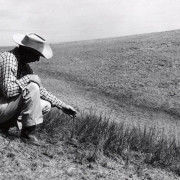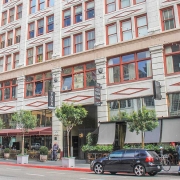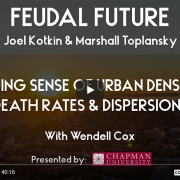Yeomanry’s Global Decline
For much of the last part of the 20th Century, the world’s middle class was ascendant, expanding and, in most countries, firmly in control of national politics and culture. Yet in more recent decades, this process has been slowly reversed, in the United States as well as in Europe and, increasingly, East Asia.
This erosion of the middle class has many roots. Globalization has savaged many middle-class jobs, whether in factories or increasingly services, transferring employment to China, India, and other developing countries. In many countries, immigration, much of it from poor countries, has posed a threat to wage rates, particularly for lower skilled workers and increasingly professionals as well.
In the United States, long seen as the great land of opportunity, the chance of middle-class earners moving up to the top rungs of the earnings ladder has dropped by approximately 20 percent since the early 1980s. Across the thirty-six countries of the Organization for Economic Cooperation and Development (OECD), the richest citizens have taken an ever-greater share of national GDP, and the middle class has become smaller. Much of the global middle class is heavily in debt, mainly because of high housing costs, and looks increasingly like a boat in rocky waters, suggests the OECD.
Traditionally, those classes hurt most by what pundits may praise as transformative change would turn to the political class that identifies with their interests. But in many countries where parties once strongly tied to middle- and working-class interests – the Australian and British Labour Parties, the German Social Democrats, or the American Democrats – are no longer working class in nature but dominated by an alliance among the ultra-rich, particularly in tech, well-paid professionals, government workers and those most dependent on government aid.
Capitalism out of the soil
The earliest democracies in Athens and Rome rested on an assertive, property-owning middle class. Later on, as slaves and elites grew to dominate ancient societies, displacing the middle orders, they became more monarchical and autocratic. In imperial Rome, small farmers and artisans were being displaced by slaves imported from the far ends of the expanding empire. Occupations and social status came to be determined by heredity. By the end of the Republic, over 75 percent of all property was owned by roughly 3 percent of the population, while over four-fifths owned no property. These were the roots of the political economy that would define the Middle Ages.
This process was reversed slowly, starting with the rise of the autocracy-dominated Venice Republic, and its analogue trading states. The most important development took place later, in the Low Countries, where property ownership expanded as swamps were drained, and dikes rected, allowing new people to own land. As the economic historian Jan de Vries observed, «capitalism grew out of the soil in Holland.
With capitalism, and a rising middle class, Holland became a progenitor of modern democracy free from aristocratic or clerical domination, as the expulsion of the feudally inclined Spanish overlords empowered the bourgeoisie. The Dutch expanded human rights, including those of religious minorities and women. Dutch culture was family-centered, inventive, sober, frugal, and tolerant. Some immigrants came as merchants or artisans, but even the poorest, observed one Dutchman in 1692.
Over the ensuing centuries saw the rise of the yeomanry across large parts of Europe, North America, and Oceania. Rather than create the dystopia that Marx predicted, capitalism, with reforms, instead uplifted a large portion of the masses and created a solid middle class (a designation first used in Britain in 1812). A study covering the United Kingdom, the Netherlands, and the United States shows that all three saw a rapid decline in the concentration of wealth from the 1820s up to the 1970s. Never before had so much prosperity and relative economic security been so widely enjoyed.
Read the rest of this piece at Schweizer Monat.
Joel Kotkin is the author of The Coming of Neo-Feudalism: A Warning to the Global Middle Class. He is the Presidential Fellow in Urban Futures at Chapman University and Executive Director for Urban Reform Institute. Learn more at joelkotkin.com and follow him on Twitter @joelkotkin.
Photo credit: U.S. National Archives, Public Domain


 Gage Skidmore, used under CC 2.0 License
Gage Skidmore, used under CC 2.0 License




